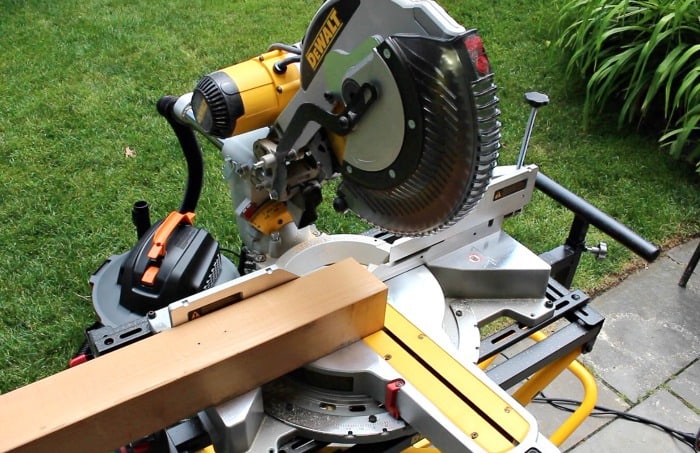Yes, a 10-inch miter saw can cut a 4×4, but you have to approach it the right way. Since a real 4×4 is 3.5 inches thick, a standard 10-inch saw usually can’t cut all the way through it in one single pass. The blade just doesn’t go deep enough. However, with the right technique—or even better, a sliding miter saw—you can still manage to get a safe, clean cut.

Image Source: jaimecostiglio.com
Fathoming Miter Saw Capacity
Before attempting to cut a 4×4 with any miter saw, it’s critical to grasp the limitations of your tool. Miter saw blade size for 4×4 is a key factor.
- Maximum Cut Depth: A standard 10-inch miter saw usually has a maximum cut depth of around 3 inches at 90 degrees. This is less than the actual dimensions of a 4×4.
- Sliding vs. Non-Sliding: A sliding miter saw extends the cutting capacity. The blade can slide along rails, allowing you to cut wider boards than a non-sliding saw. A 10 inch sliding miter saw 4×4 cutting capacity is significantly better.
- Miter Angle: Angled cuts reduce the cutting capacity. The more extreme the angle, the less depth you can cut.
- Base Height: The height of the miter saw base can sometimes interfere with cutting taller stock.
Can a 10 Inch Miter Saw Cut a 4×4? – Examining the Options
The question of cutting 4×4 with 10 inch miter saw is not simply a yes or no. Here are the possibilities:
1. The Impossible Dream: Single Pass Cut (Usually)
A standard 10-inch miter saw generally cannot cut a 4×4 in a single pass. The blade simply isn’t large enough to cut through the full 3.5 inches of material.
2. The Sliding Miter Saw Solution
A 10-inch sliding miter saw can often cut a 4×4 in a single pass. The sliding function allows you to move the blade across the entire width of the lumber. Always double-check the specific 10 inch miter saw 4×4 capacity stated in the manufacturer’s specifications.
3. The Flip-and-Finish Method
If you have a non-sliding miter saw, you can use the flip-and-finish method. This involves cutting partway through the 4×4, flipping it over, and then finishing the cut from the other side. This requires extreme precision to ensure the cuts meet correctly.
Safe Methods for Cutting 4×4 with 10 Inch Miter Saw
Safety is paramount when working with power tools. Here’s how to ensure safe methods for cutting 4×4 with 10 inch miter saw:
- Wear Safety Gear: Always wear safety glasses, hearing protection, and a dust mask.
- Secure the 4×4: Use clamps to hold the 4×4 firmly in place. This prevents it from moving during the cut and reduces the risk of kickback.
- Make Multiple Passes (If Necessary): If using the flip-and-finish method, make shallow cuts on each side to avoid splintering.
- Use a Sharp Blade: A dull blade can cause the saw to bind and kick back. A sharp blade cuts smoothly and efficiently.
- Keep Hands Clear: Keep your hands well away from the blade path.
- Avoid Force: Let the saw do the work. Don’t force the blade through the wood.
- Work in a Well-Lit Area: Good visibility is essential for accurate and safe cuts.
The Flip-and-Finish Method: Step-by-Step
This method is useful if you don’t have a sliding miter saw.
- Mark the Cut Line: Use a pencil and square to accurately mark the cut line on all four sides of the 4×4.
- Secure the 4×4: Clamp the 4×4 firmly to the miter saw fence.
- Make the First Cut: Cut as deep as your saw allows, following the marked line.
- Flip the 4×4: Carefully flip the 4×4 over, aligning the opposite marked line with the blade.
- Complete the Cut: Finish the cut, being very careful to align the blade with the existing cut.
- Check the Cut: Ensure the two cuts meet cleanly. If not, make slight adjustments and repeat the process.
Factors Affecting Cut Quality
Several factors influence the quality of your cuts.
- Blade Quality: A high-quality blade with the correct tooth count for the wood type will produce cleaner cuts.
- Saw Condition: A well-maintained saw with properly aligned components will deliver more accurate cuts.
- Cutting Speed: Cutting too quickly can cause the blade to vibrate and splinter the wood.
- Wood Type: Softer woods are easier to cut than hardwoods. Hardwoods may require a more aggressive blade.
The Best Miter Saw for 4×4 Cuts
While a 10-inch sliding miter saw can work, for frequent 4×4 cutting, consider a 12-inch sliding miter saw. These offer greater capacity and power. When choosing, look for these features that make it the best miter saw for 4×4 cuts:
- High Cutting Capacity: A 12-inch sliding miter saw generally has a cut depth of 4 inches or more at 90 degrees.
- Powerful Motor: A powerful motor ensures smooth cutting, even through dense lumber.
- Sturdy Construction: A robust saw will withstand heavy use and maintain accuracy over time.
- Laser Guide or LED Light: These features help you align the blade with the cut line accurately.
- Dust Collection: A good dust collection system keeps your work area clean and improves visibility.
Alternatives to Cutting 4×4 with a Miter Saw
If a miter saw isn’t suitable, consider these alternatives to cutting 4×4 with miter saw:
- Circular Saw: A circular saw with a guide can make accurate cuts in 4×4 lumber.
- Hand Saw: For small projects, a hand saw can be used. However, this requires more effort and precision.
- Band Saw: A band saw is a versatile tool that can cut through thick lumber with precision.
- Reciprocating Saw: A reciprocating saw is useful for rough cuts and demolition work.
Reinforcing Cut 4×4 Miter Saw Joints
When using the flip-and-finish method, the joint may not be perfectly flush. Consider these methods for reinforcing cut 4×4 miter saw joints:
- Wood Glue: Apply wood glue to the cut surfaces before joining them.
- Screws or Nails: Drive screws or nails through the joint to reinforce it.
- Metal Brackets: Use metal brackets to reinforce the joint and add stability.
- Wood Filler: Use wood filler to fill any gaps in the joint and create a smooth surface.
Troubleshooting Common Problems
- Splintering: Use a sharp blade and make shallow cuts to minimize splintering.
- Misaligned Cuts: Double-check the alignment of the blade and the 4×4 before each cut.
- Kickback: Ensure the 4×4 is securely clamped and avoid forcing the blade through the wood.
- Burning: A burning smell indicates a dull blade or cutting too slowly.
Detailed Specifications Table
| Feature | Standard 10-Inch Miter Saw | 10-Inch Sliding Miter Saw | 12-Inch Sliding Miter Saw |
|---|---|---|---|
| Max Cut Depth @ 90° | ~3 inches | ~3 inches (depending on model) | 4+ inches |
| Max Cut Width @ 90° | ~5-6 inches | 12+ inches | 14+ inches |
| 4×4 Cutting Ability | Difficult, requires flip method | Possible in one pass (check specs) | Easy in one pass |
| Motor Power | 13-15 amps | 13-15 amps | 15 amps |
| Weight | 30-40 lbs | 40-50 lbs | 50-60 lbs |
| Portability | High | Medium | Low |
Conclusion
While a standard 10-inch miter saw may struggle to cut a 4×4 in a single pass, a 10-inch sliding miter saw often can, provided its 10 inch miter saw 4×4 capacity is sufficient. Always prioritize safety, use the correct techniques, and consider a 12-inch model for frequent or demanding 4×4 cutting tasks. Remember to use the correct miter saw blade size for 4×4 material.
Frequently Asked Questions (FAQ)
Q: Can I cut a 4×4 with a 10-inch miter saw if I make multiple passes?
A: Yes, using the flip-and-finish method allows you to cut a 4×4 with a standard 10-inch miter saw by cutting partially through, flipping the lumber, and completing the cut from the opposite side.
Q: What is the best way to prevent splintering when cutting a 4×4 with a miter saw?
A: Use a sharp blade designed for the material you are cutting. Make sure to clamp down the 4×4 tightly to reduce movement, and cut slowly. You can also score the cut line with a utility knife before making the cut.
Q: What kind of blade should I use for cutting a 4×4 with a miter saw?
A: A blade with a high tooth count (60-80 teeth) will produce smoother cuts, especially in hardwoods. For general-purpose cutting, a blade with 40-60 teeth is suitable.
Q: What safety precautions should I take when cutting a 4×4 with a miter saw?
A: Always wear safety glasses and hearing protection. Ensure the 4×4 is securely clamped. Keep your hands clear of the blade path. Never force the saw through the wood.
Q: Is a sliding miter saw necessary for cutting 4×4 lumber?
A: Not absolutely necessary, but a sliding miter saw makes the job much easier and safer, particularly when cutting at angles. It provides the needed maximum cut depth 10 inch miter saw.
Q: What are some signs that my miter saw blade needs to be replaced?
A: Signs include difficulty cutting, burning the wood, excessive vibration, and visible damage to the blade teeth.
Q: Can I cut treated lumber with a miter saw?
A: Yes, but wear a dust mask to avoid inhaling the dust from treated lumber, and clean your saw thoroughly afterward.

Hi, I’m Tom Scalisi, and welcome to The Saw Blog! I started this blog to share my hands-on experience and insights about woodworking tools—especially saws and saw blades. Over the years, I’ve had the chance to work with a wide range of tools, and I’m here to help both professionals and hobbyists make informed decisions when it comes to selecting and using their equipment. Whether you’re looking for in-depth reviews, tips, or just advice on how to get the best performance out of your tools, you’ll find it here. I’m excited to be part of your woodworking journey!
